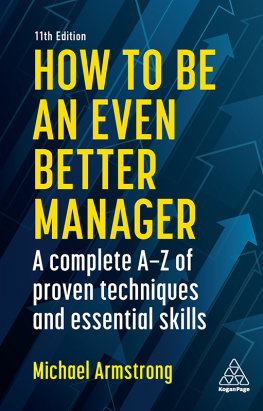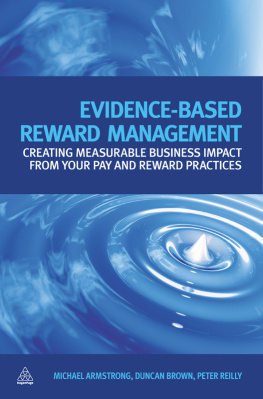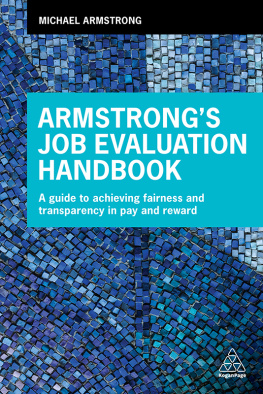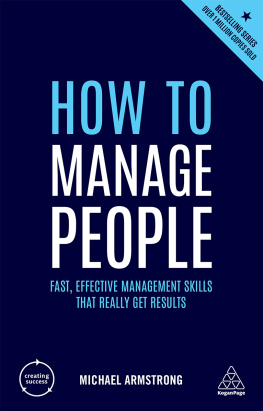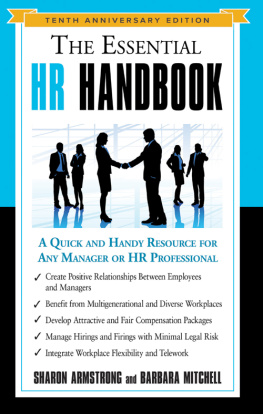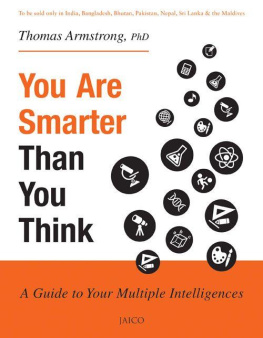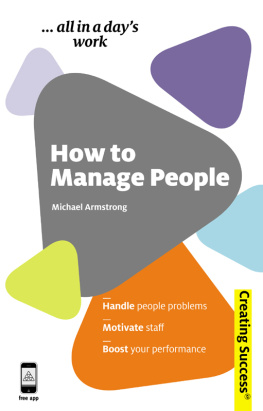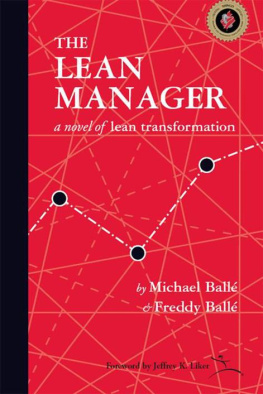Armstrong Michael - How to Be an Even Better Manager
Here you can read online Armstrong Michael - How to Be an Even Better Manager full text of the book (entire story) in english for free. Download pdf and epub, get meaning, cover and reviews about this ebook. year: 2021, publisher: Kogan Page, Limited, genre: Business. Description of the work, (preface) as well as reviews are available. Best literature library LitArk.com created for fans of good reading and offers a wide selection of genres:
Romance novel
Science fiction
Adventure
Detective
Science
History
Home and family
Prose
Art
Politics
Computer
Non-fiction
Religion
Business
Children
Humor
Choose a favorite category and find really read worthwhile books. Enjoy immersion in the world of imagination, feel the emotions of the characters or learn something new for yourself, make an fascinating discovery.
- Book:How to Be an Even Better Manager
- Author:
- Publisher:Kogan Page, Limited
- Genre:
- Year:2021
- Rating:3 / 5
- Favourites:Add to favourites
- Your mark:
- 60
- 1
- 2
- 3
- 4
- 5
How to Be an Even Better Manager: summary, description and annotation
We offer to read an annotation, description, summary or preface (depends on what the author of the book "How to Be an Even Better Manager" wrote himself). If you haven't found the necessary information about the book — write in the comments, we will try to find it.
How to Be an Even Better Manager — read online for free the complete book (whole text) full work
Below is the text of the book, divided by pages. System saving the place of the last page read, allows you to conveniently read the book "How to Be an Even Better Manager" online for free, without having to search again every time where you left off. Put a bookmark, and you can go to the page where you finished reading at any time.
Font size:
Interval:
Bookmark:
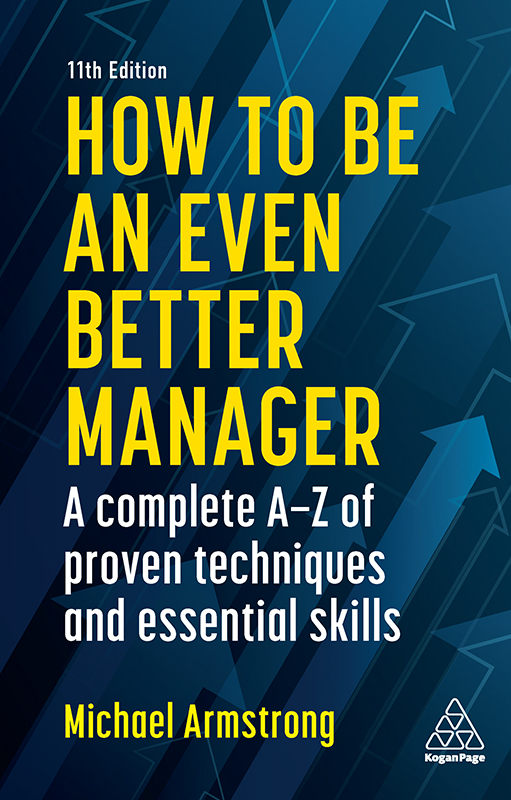
This eleventh edition of How to be an Even Better Manager covers 40 key aspects of management and has been extensively revised since the tenth edition was published in 2017. The book is for those who want to develop their managerial capabilities and competences, and covers all the key skills that managers use. It refers to the main aspects of managing people and the activities with which managers need to be familiar, and will be particularly useful for those seeking to obtain qualifications in management.
You can dip into this book at any point each chapter is self-contained. But it would be useful to read first. This defines the overall concept of management and the areas in which managers need to be competent, thus providing a framework for the succeeding chapters that deal with the specific skills and techniques involved in managing people and processes.
As a manager my purpose is to serve the greater good by bringing people and resources together to create value that no single individual can create alone.
HARVARD BUSINESS SCHOOL
To be effective is the job of the executive.
PETER DRUCKER
The Management Standards Centre has stated that the key purpose of management is to provide direction, facilitate change and achieve results through the efficient, creative and responsible use of resources. Managers are there to get results. To do this they have to deal with events and eventualities. They operate in a VUCA world one that is volatile, uncertain, complex and ambiguous.
Management can be described as deciding what to do and then getting it done through people. This definition emphasizes that people are the most important resource available to managers. It is through this resource that all other resources processes and systems knowledge, finance, materials, plant, equipment, etc will be managed.
But managers have to manage themselves as well as other people. They cannot delegate everything. They frequently have to rely on their own resources to get things done. These resources consist of experience, know-how, skill, competences and time, all of which have to be deployed not only in directing and motivating people but also in understanding situations and issues, problem analysis and definition, decision-making and taking direct action themselves as well as through other people. They will get support, advice and assistance from their staff, but in the last analysis they are on their own. They have to make the decisions and they have to initiate and sometimes take the action.
The overall process of management is subdivided into a number of individual processes. Their purpose is to bring as much system, order, predictability, logic and consistency to the task of management as possible in the ever-changing, varied and turbulent environment in which managers work. The classical theorists of management said that it involved:
Planning Deciding on a course of action to achieve a desired result.
Organizing Setting up and staffing the most appropriate organization to achieve the aim.
Motivating Exercising leadership to motivate people to work together smoothly and to the best of their ability as part of a team.
Controlling Measuring and monitoring the progress of work in relation to the plan and taking corrective action when required.
But this view has been challenged by researchers who studied how managers actually spend their time. They observed that while, no doubt, managers did plan, etc, their work was not so orderly and disciplined as these writers described. In practice, the work of managers is fragmented, varied and subject to continual adjustment. It is governed to a large degree by events over which managers have little control and by a dynamic network of interrelationships with other people.
Managers attempt to control their environment, but sometimes it controls them. They may consciously or unconsciously seek to plan, organize, direct and control, but their days almost inevitably become a jumbled sequence of events. They carry out their work on a day-to-day basis in conditions of variety, turbulence and unpredictability. As Derek Torrington observed: They typically spend over half their working day in conversation and constantly switching between topics. They are submerged by e-mails at work and after hours. Managers have to be specialists in ambiguity, with the ability to cope with conflicting and unclear requirements.
Thus management is a process involving a mix of rational, logical, problem-solving, decision-making activities, and intuitive, judgemental activities. A knowledgeable and rational approach to managing people and events and the deployment of management skills as described in this book are desirable. But to be an effective manager you need the personal qualities required to cope with uncertainty, pressure and change. These include agility, flexibility and resilience.
The Skills Builder Partnership published in 2020 the following list of essential skills for managers and others (the chapter numbers in which these skills are described in this book are given for each skill):
Listening The receiving, retaining and processing of information or ideas. ()
Presenting The oral transmission of information or ideas. ()
Problem-solving The ability to find a solution to a complex situation or challenge. ()
Creativity The use of imagination and the generation of new ideas. ()
Staying positive The ability to use tactics and strategies to overcome setbacks and achieve goals. ()
Aiming high The ability to set clear, tangible goals and devise a robust route to achieving them. ()
Leadership Supporting, encouraging and motivating others to achieve a shared goal. ()
Teamwork Working cooperatively with others towards achieving a shared goal. ()
Better managers recognize that the art of management is something they need to learn. No one becomes a fully competent manager overnight. It is often said that experience is the best teacher. But is experience alone sufficient? Several writers have expressed their doubts on this score. The historian Froude wrote that experience teaches slowly and at the cost of mistakes. Tennyson called it a dirty nurse. Oscar Wilde noted that experience is the name everyone gives to their mistakes.
Experience is an essential way of learning to improve, but it is an imperfect instrument. We also need guidance from a good manager and from other sources, such as this book. These can help us to interpret our experience, learn from our mistakes and make better use of our experience in the future.
The seventeenth-century philosopher Francis Bacon perhaps provided the best answer to this question of the role of experience when he wrote: studies perfect nature and are perfected by experience. The art of management, and it is an art, is important enough to be studied. The aim of such studies should be to help us to make better use of our natural attributes our personality and intelligence and to ensure that past experience is better interpreted and more fully used, and that future experience is more quickly and purposefully absorbed.
Next pageFont size:
Interval:
Bookmark:
Similar books «How to Be an Even Better Manager»
Look at similar books to How to Be an Even Better Manager. We have selected literature similar in name and meaning in the hope of providing readers with more options to find new, interesting, not yet read works.
Discussion, reviews of the book How to Be an Even Better Manager and just readers' own opinions. Leave your comments, write what you think about the work, its meaning or the main characters. Specify what exactly you liked and what you didn't like, and why you think so.

